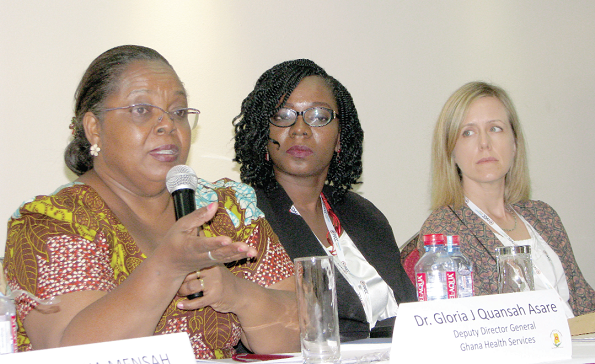
Ghana to pilot new indoor residual spraying insecticide
A new indoor residual spraying (IRS) insecticide, “SumilShield 50WG”, which contains a new mode of active ingredient that provides excellent control of malaria transmitting mosquitoes, has been introduced into the country.
The new insecticide will deal with vector resistance of the current insecticide being used for the indoor residual spraying intervention of malaria control in Ghana.
SumilShield 50WG, which is odourless with low toxicity, will be piloted in some communities in Ghana through donor funding.
Partners
The insecticide was manufactured by Sumitomo Chemical Company, in partnership with Unitaid, a global health initiative working to end tuberculosis, HIV/AIDS, malaria and Hepatitis C, and the Innovative Vector Control Consortium (IVCC).
The IVCC is a public-private partnership international organisation, which develops new insecticides for use in bed nets and indoor residual spraying.
The local partners include the government of Ghana, the Ministry of Health, the Ghana Health Service and the Anglogold Ashanti Malaria Control Programme.
Launch
In her remarks at the launch of the “SumilShield 50WG in Accra yesterday, the Deputy Minister of Health, Ms Tina Mensah, underscored the urgent need for such innovations because although Ghana had made significant progress through the National Malaria Control Programme, the disease remained endemic.
“This is because there is one challenge that threatens the gains made, which is vector mosquitoes building resistance to the various indoor residual spraying insecticides, which has been a major aspect of malaria control in Ghana,” she said.
She said malaria was still ranked the number one leading causes of death, particularly, in children under five years.
The project Director of NgenIRS, a Unitaid funded initiative to expand the use of new anti-malarial insecticides, Mr David McGuire, said IRS was a powerful way to rapidly reduce malaria transmission by spraying insecticides on indoor walls and ceilings where malaria-carrying mosquitoes were likely to rest.
He, however, noted that many mosquitoes became resistant to the insecticides that they often came into contact with.
“New insecticides are, therefore, needed to minimise the threat of resistance,” he said.
The Japanese Ambassador to Ghana said the authenticity of the company Sumitomo Chemical Company could be guaranteed because it was an ancient company Japan was proud of.
“Ghanaians can, therefore, be rest assured that the product would be effective and we are in support of the initiative,” he said.
Writer’s email
